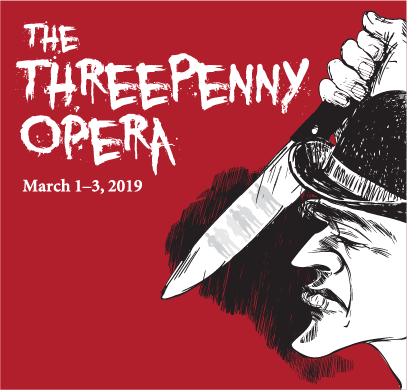Is This What You Call Living? The Threepenny Opera has a Message for Society

Image courtesy of arts.catholic.edu
By Miriam Trujillo
Over this past weekend, drama and music theatre students put on their spring musical, The Threepenny Opera, composed by Kurt Weil, written by Bertolt Brecht, and directed by Pauline Grossman and Patrick Gardner. The cast members played four sold-out shows to audiences in the Callan Theater: a small and dark auditorium located in Hartke Theater, whose seedy appearance matched the tone of the show.
The Threepenny Opera is not a comforting sight to see, but it does offer an important perspective of society, it shows the terrible consequences that come about when
The audience watched to see tensions arise between him and his fellow criminals, as they routinely use each other and turn on each other. They see the twisted forms of beggars that fill London’s streets, although no one seems to notice them. Maybe most of all, they see the unhappiness that is manifested in nearly every character, living in such squalid circumstances.
Polly Peachum, the second girl that Mack marries, is quickly forgotten by Mack and slowly turns from a hopeful romantic child into a jaded woman. Jenny Driver, Mack’s favorite prostitute, adeptly played by sophomore Elizabeth Ludlum, alternates between restlessness, unstable exuberance, and misery. In every scene and song, the audience could see that The Threepenny Opera takes place in a world were sin and crime are more common than goodwill. Throughout the show, we see the toll that this world takes on the characters.
In a society deprived of nearly all hope, one image, however, seems to shed a faint ray of light onto London’s darkness. At various times, throughout the show, characters consistently mention the moon. It’s an odd bit of imagery, and easily forgotten. Yet, the idea of a tranquil higher beauty, which nobody is too wretched to see and love, provides a much needed foil to the vivid misery of The Threepenny Opera. In the light of their moon, even the most twisted characters seemed more human.
The image of a miserable society was clear thanks to the performers’ boundless energy and dedication to their show.
“Every single cast member was fully committed and thoroughly entertaining. So much fun.” said Katie Malone, a sophomore vocal performance major.
Throughout the course of the lengthy performance, the actors would switch from their respective characters into a Greek Chorus-like ensemble that allowed them comment on the action of the story, and demand justice for the poor. They collaborated in tightly choreographed dances and played instruments, adding a particularly raw tone to the jazzy music of Threepenny.
The characters mingled with the audience, making the entire auditorium feel as if it was part of the London streets. Each performer contributed passionately, with standout performances by Olivia Coniglio and Hailey Ibberson. Coniglio’s rich voice, equally strong in both high and low registers, made her every song a clear treat, even without the support of a microphone. Ibberson as Lucy Brown, Mack’s wife before Polly Peachum, brought a compelling portrayal of jealousy and bitterness, making the story’s sorrow even more poignant.
The costumes, portrayed depravity in all its wretched colours, and the dusty sets were the perfect scene to tell the story of poverty’s tragedy. The ensemble of beggars were perhaps the most important characters of the show. They were portrayed in a very stylized fashion, so twisted and mindless, that they barely even seemed to be human, driving home the show’s message, that it is unforgivable to ignore those in need.
The sense of gloom only deepens as Polly Peachum’s parents succeed in getting Mack the Knife arrested and sentenced to execution. Macheath who, up until that moment, has treated all the suffering around him with apathy, suddenly panics. For the first time in the show, he has a share in the misery he has caused. Any production that portrays a character’s acknowledgment of his own death is chilling, and Benjamin Hergenroeder, who played Mack delivered a convincing performance. The Threepenny Opera does not end here. Instead, in a cynical take on a fairytale ending, a cartoonish messenger comes from Queen Victoria, reprieves Mack, and makes him a rich lord. Mack steps down from the gallows amidst cheers, but in the final song questions the plausibility of the Mack’s sudden forgiveness, and the audience is left with the vague, uneasy image of the forgotten poor.







